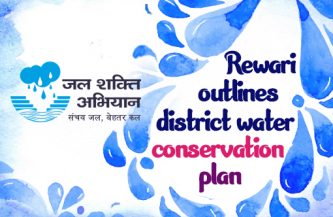Educating Mansa Children about conservation of water through Soak Pits

Introduction
Mansa District falls in the southern part of Punjab. Agriculture forms the backbone of the district economy. The main source of irrigation is canals, dug wells and tube wells. The major concern
of the district is depleting water table. Being a desert district, Mansa has sandy soil, which has great absorption capacity and a low groundwater level. This makes the district suitable for the construction of soak pits. The idea of constructing soak pits in schools was mooted by district administration as a lot of grey water is generated from cooking midday meals and washing of utensils. Thus, constructing soak pits in the washing area would help in water conservation.

Implementation
As many companies were not familiar with the concept of soak pits and most were interested in visible impact programmes under corporate social responsibility, persuading them to fund such projects was a challenge. A lot of companies had to be approached before BPCL came forward to fund the project of soak pits in schools under their corporate social responsibility (CSR) initiative. The district administration of Mansa spoke to each Gram Panchayat for the implementation of this project with MGNREGS and CSR convergence and explained the benefits. The only requirement is to make people conscious regarding the cleanliness of the soak pits by making sure that no solid waste goes into it. The sarpanch of the Gram Panchayat, MGNREGA district coordinator, school staff, BPCL staff and the people of the village have all helped in the implementation. The work was taken up during the FY 2018–2019 with an expenditure of Rs. 1.95 lakhs.

Impact
The project is benefitting in recharging groundwater from the daily wastewater generated in schools through midday meal scheme (utensils washing) and water near drinking water sources and rainwater. This project helps in sensitizing children about water conservation and serves as a live demo for children to learn about water conservation process. Making them aware has helped their parents and other villagers to understand the relevance of soak pits. As a result of the implementation of this work, approximately 200 litres of grey water/wastewater per school is being recharged into ground on a daily basis, and 53 schools have been benefitted. This initiative will slowly and steadily replenish the groundwater in the vicinity. The soak pits have checked the breeding of mosquitoes and flies. In one of the schools of this village, a handpump, which had dried up, has revived.





